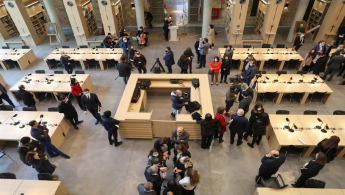Lebanon's National Library reopens after port blast damage repaired
Lebanon’s National Library, damaged in the massive August 2020 Beirut port explosion, reopened on Thursday following repairs.
The renovated library was inaugurated by Lebanese Prime Minister Najib Mikati. Among those attending the inauguration were senior government officials, foreign diplomats, and academics
Happy to have attended today the reopening of #Beirut National Library, one of #Lebanon’s important cultural landmarks. 🇱🇧 @grandserail @MocLebanon @JugeMMourtada pic.twitter.com/nFKoxgTi2I
— Ann Dismorr (@Ann_Dismorr) February 10, 2022
The library's director-general, Hassan Adonis, said that the National Library is of great value because its role is to preserve the country’s intellectual heritage.
"Here lies its importance, especially since it is located in a historic building that was established as a school and then a law faculty, and today is the National Library," he said.
Adonis said the library can accommodate up to 300 visitors at a time.
It is already home to hundreds of thousands of volumes in different languages, with its older collection preserved in climate-controlled basements.
"In light of current circumstances, and in spite of all that our beloved Lebanon is suffering from, the pulse of life will return to the heart of the National Library in Beirut," wrote Culture Minister Mohammad Mortada on Twitter a day before the opening.
في ظلّ الظروف الرّاهنة، وعلى الرّغم من كلّ ما يعانيه لبناننا الحبيب...سيعود نبض الحياة إلى قلب المكتبة الوطنيّة في بيروت... نلتقي غداً في ١٠ شباط ٢٠٢٢ في احتفال افتتاحها بعد التّرميم. pic.twitter.com/CntQ5FAiFs
— القاضي محمد وسام المرتضى وزير الثقافة (@JugeMMourtada) February 9, 2022
Located in west Beirut’s Sanayeh district, the library was established in 1921 and was originally located elsewhere.
It closed in 1979 after being repeatedly bombed and looted during the civil war which erupted only four years earlier. Restoration began in 1999, but was constantly delayed.
The library finally reopened to the public in 2018 in its new location, neighbouring some of Beirut’s most important public and private institutions.
Windows, doors and fixtures damaged in the 2020 blast were replaced.





 Follow the Middle East's top stories in English at The New Arab on Google News
Follow the Middle East's top stories in English at The New Arab on Google News
![The UAE is widely suspected of arming the RSF militia [Getty]](/sites/default/files/styles/image_330x185/public/2024-11/GettyImages-472529908.jpg?h=69f2b9d0&itok=Yauw3YTG)
![Netanyahu furiously denounced the ICC [Getty]](/sites/default/files/styles/image_330x185/public/2024-11/GettyImages-2169352575.jpg?h=199d8c1f&itok=-vRiruf5)
![Both Hamas and the Palestinian Authority welcomed the ICC arrest warrants [Getty]](/sites/default/files/styles/image_330x185/public/2024-11/GettyImages-2178351173.jpg?h=199d8c1f&itok=TV858iVg)